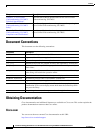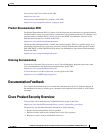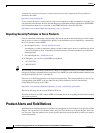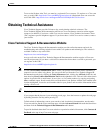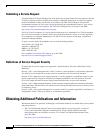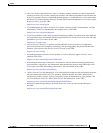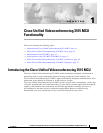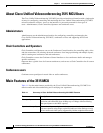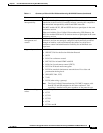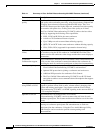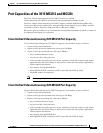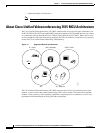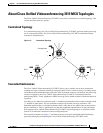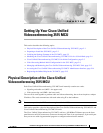
1-2
Installation and Upgrade Guide for Cisco Unified Videoconferencing 3515 MCU12 and MCU24 Release 5.1
OL-11897-01
Chapter 1 Cisco Unified Videoconferencing 3515 MCU Functionality
About Cisco Unified Videoconferencing 3515 MCU Users
About Cisco Unified Videoconferencing 3515 MCU Users
The Cisco Unified Videoconferencing 3515 MCU provides an intuitive web interface with a single point
of entry for configuring, controlling and monitoring the Cisco Unified Videoconferencing 3515 MCU
unit and conference sessions. Access to the interfaces is password-protected for four types of
users—Administrators, Chair Controllers, Operators and conference users.
Administrators
Administrators use the Administrator interface for configuring, controlling and managing the
Cisco Unified Videoconferencing 3515 MCU, conference services and supporting devices and
applications.
Chair Controllers and Operators
Chair Controllers and Operators can use the Conference Control interface for controlling audio, video
and data connections, for selecting advanced conference view image positioning and multiple layouts,
and for creating new conferences and sub-conferences.
Chair Controllers can use the Conference Control interface to view conference details and manage a
specific conference.
Operators have a global view of all current conferences, and can act as Chair Controllers for all current
conferences.
Conference users
Conference users participate in actual video or audio conferences.
Main Features of the 3515 MCU
Table 1-1 lists the main features provided by the Cisco Unified Videoconferencing 3515 MCU for
effective audio and videoconferencing and a satisfying user experience.
Table 1-1 Summary of Cisco Unified Videoconferencing 3515 MCU Features
Feature Description
Flat capacity Each conference participant can connect with his or her own optimal codec,
resolution and bandwidth (from 64 Kbps up to 2 Mbps) without affecting
other participants or the MCU capacity.
Superior video quality Video and audio processing is carried out per user rather than per conference.
Each user connects using unique, optimized audio and video settings to enjoy
the best audio and video quality supported by his/her endpoint and network.



